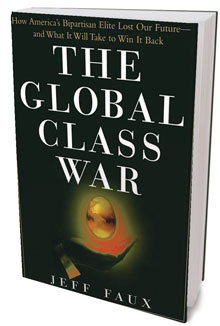 Written by a former Mainer, The Global Class War barely mentions Maine, but it explains what is happening economically in our state — as well as in the world. Jeff Faux tells the harsh truth about globalization, and he presents an alternative to the miseries it creates.
Written by a former Mainer, The Global Class War barely mentions Maine, but it explains what is happening economically in our state — as well as in the world. Jeff Faux tells the harsh truth about globalization, and he presents an alternative to the miseries it creates.
Why have Maine’s manufacturing industries — like textile and paper mills — virtually collapsed? Why are the service industries we thought would take their place — like call centers — now threatened? Why do the politicians — like John Baldacci — respond to this scene by kissing the asses of multinational-corporation executives who are the problem, not the solution? When Georgia-Pacific held a press conference in March to announce it was closing the Old Town paper mill, our governor practically patted the G-P executioner on the back as he administered the lethal injection.

Maine is suffering because of “the China price.” As Faux relates, Mr. Coffee factory workers used to get $21 an hour in the United States. But Mr. Coffee’s parent corporation Sunbeam moved production to Mexico, where the workers got $2.36. Production then was moved to China, where the workers get 47 cents an hour. Faux notes that “60 percent of China’s exports are shipped by foreign firms.” Many are American-based multinationals. The China price also is the India price, as we know from the accents of the telemarketers who call us at dinnertime on behalf of American companies.
If unrestrained, the China price — the globalization of goods and services as corporations roam the world hunting for greater profits — must lower our standard of living, “if we are to compete globally.” Have you heard that line as your good-paying job was eliminated, your pension was cut, or your health-care plan became too expensive? And, “if we are to compete globally,” forget about saving those nice animals of the Arctic National Wildlife Preserve from the destructions of oil drilling.
We’re not even being sacrificing to benefit the poor masses of China and India. In those countries, globalization’s increases in income are extremely inequitably distributed, and environments are being wrecked. Let’s not mention near-slave labor in many developing-world factories.
But some people in the US and worldwide, including China and India, are doing very well from globalization: the rich who own, manage, or serve the international corporations. They also own and manage much of the news media and the political system, so you don’t hear a lot about alternatives to globalization. Sucking up to the corporate rich — like both Democrat Baldacci and our Republicans do — it seems the only way.
There is another way. First, we have to recognize that it’s the global rich against the rest of us, writes economist Faux, founder of Washington’s Economic Policy Institute and, for nearly 15 years as he studied and wrote, a resident of a modest Cape Cod house in Whitefield, Maine.
His taboo-breaking title has attracted attention. The Global Class War came out only a few months ago and is already in its fourth printing. In a jargon-free, fact-filled style, Faux describes how the corporate class sets the political agenda in this country, Canada, and Mexico (he concentrates on North America) as well as in the world. He details how the neoconservative movement (outside the US, it’s called neoliberal) sold laissez-faire ideology and practice to Clinton Democrats and Bush Republicans — “American’s bipartisan governing class.”
Faux shows how class solidarity transcends patriotism, when it’s a question of maximizing wealth: “As globalization integrates investors, managers, and professionals across borders, it merges their class interests across those same borders.” Nation-states, in fact, are increasingly powerless before international capitalists. Informal world government by corporations already exists. The North American Free Trade Agreement (NAFTA) and the World Trade Organization are accords that trump national laws on environmental protection and worker rights.
There’s a problem
But the first big free-trade zone without restraints, NAFTA, has riled the working class and many of the middle class in the three affected countries. It has pushed millions of small Mexican farmers off their land because of cheap US agribusiness imports. So a quarter of Mexico’s workers are now in the US, many illegally, and their immigration has provoked a sharp national debate. NAFTA also has pushed hundreds of thousands of workers out of their factories in Canada and our country (per capita, Maine has been the state the worst hit in the loss of manufacturing jobs). There is an economic law that it is to capitalists’ benefit to have prosperous workers/consumers, but globalization has severed the interests of the corporate elite from North American working people because they can get their workers elsewhere.
Outsourcing, however, has made the US import-addicted. We have been buying far more from the rest of the world than we are selling, and governmental, consumer, and corporate borrowing — to a large extent, from our overseas suppliers, including China — finances this huge trade deficit. The US has become the world’s largest debtor.